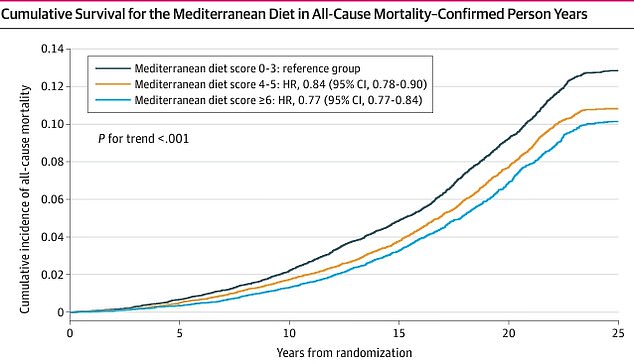The Mediterranean diet has been found to reduce the risk of death from all causes by almost a quarter in women.
A study of more than 25,000 healthy middle-aged American women with an average age of 55 found that eating a diet rich in fish, legumes, vegetables, nuts and whole grains was linked to a 23 percent lower risk of dying by the end of the 25-year study.
Each woman was questioned annually about her adherence to the diet, and those who followed it strictly during that 25-year period enjoyed a 16 percent lower risk of death from all causes.
The Mediterranean diet, which has been crowned the best diet for seven consecutive years, has been shown to reduce inflammation in the body, improve the body’s insulin regulation and control weight, all of which protect against heart disease, dementia and diabetes.
The diet is common in Greece, Italyand Spaincountries bordering the Mediterranean Sea.
The diet is based on the diets of countries bordering the Mediterranean Sea, emphasizing vegetables, healthy fats such as olive oil and nuts, and proteins derived from fish and beans.

The researchers found that women with high compliance scores of six or more were 23 percent less likely to die from all causes, while those with a score of four or five had a 16 percent lower risk.
The latest Harvard University study is among the largest, with 25,315 women involved, and perhaps the longest-running, following the women for more than two decades.
At the start of the study, women completed health questionnaires about their eating habits, health, height, and weight to calculate BMI.
Their blood pressure was also evaluated.
Participants completed health questionnaires every six months for the first year and annually thereafter.
The researchers assigned diet adherence scores on a scale of zero to nine, with a higher score indicating that the woman followed the diet closely.
The score was based on the intake of nine dietary components, including a high intake of vegetables (except potatoes), fruits, nuts, whole grains, fish and monosaturated fats.
If a woman ate less red and processed meat, she got points. If her alcohol consumption fell between five and 15 grams per day, she got an extra point.
Participants were then divided into three categories based on their scores: low adherence scores ranged from zero to three, intermediate adherence scores ranged from four to five, and high adherence scores ranged from six to nine.
Over about 25 years, researchers counted 3,879 deaths, including 935 from heart disease and 1,531 from cancer.
Women with high compliance scores of six or more were 23 percent less likely to die from all causes, while those with a score of four or five had a 16 percent lower risk.
The researchers said: “Our results suggest that a proportion of the lower risk of mortality may be due to several cardiometabolic risk factors, in particular, biomarkers related to metabolism, inflammation, TRL pathways, insulin resistance and BMI.” .
They added: “Most of the potential benefit of adherence to the Mediterranean diet and mortality remains unexplained, and future studies should examine other pathways that could potentially mediate the lower mortality associated with the Mediterranean diet, as well as examine mortality for specific reasons.”
Their study was published in the journal. Open JAMA Network.
There are few diets that doctors like as much as the Mediterranean diet. In addition to reducing the risk of heart disease, obesity and dementia, it has a protective effect against stroke and can prolong life.
A 2016 study in the journal Current Opinion in Clinical Nutrition & Metabolic Care reported that people who followed the diet lived approximately four and a half years longer than those who did not follow it.
It is meant to be as fun as it is simple. Recipe consume lots of vegetables and fruits, reduce the consumption of red meat and incorporate fats, especially extra virgin olive oil, nuts, peanuts, olives and avocados.
The diet also recommends exercise, the first dietary pyramid to do so. The prescription is based on the lifestyles of people in countries bordering the Mediterranean, specifically Sardinia, Italy, and Ikaria, Greece.
Both are considered Blue Zones: areas of the world where people consistently reach 100 years old. People in Blue Zones plant gardens, go for walks with other members of their community, dance with friends, and do manual labor that anchors them to their environment.


